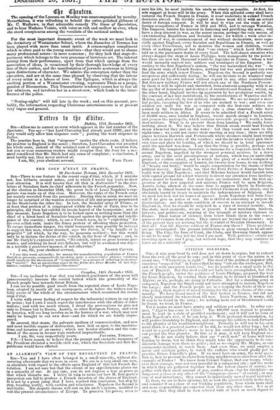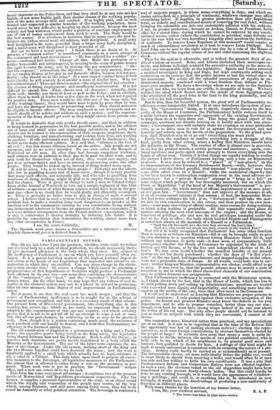CITIZEN SOLDIERS.
Salt—A wise man beset by evil does not sit down to repine, but to extract from the evil all the good he can ; and in this point of view the axiom is a sound one, "Whatever is, is right." The deed of the political impostor who contrives "coups d'etat" in France that he may "rob me the exchequer, Hal, and do it with =a -ashen hands too," has its parallel on a small scale in the case of Thurtell. But this deed could not have been accomplished, but that the French people, under the guidance of Louis Philippe, prepared the way for Louis Napoleon, by sending their ruffianry to be trained to bloodshed in Algiers ; as we, perhaps, are doing in Catfraria. But for a standing army so composed, Napoleon the Small could not have attempted to imitate Napoleon the Large; and the French people are ire .v reaping the fruits of their un- wise policy, their neglect of moral training for the poorer classes of the com- munity. We have heard much of the Red faction in France, but did not clearly understand its whereabout till now. Louis Napoleon, it seems, did. It was to be found in the army ; for nothing more red or bloodstained could be found, we trust, in France. Yet it seems we must have armies and soldiers yet awhile. In sober ear- nest, "Algiers has come to Calais." The 400,000 men trained to plunder must be kept in a state of gratified excitement; and it will not be done at Louis Napoleon's cost, if he can help it. With profound dissimulation, he will profess friendship to England, and encourage his soldiers to look forward to the plunder of his wealthiest neighbour. Probably he will not in his own mind think it a practical matter—if he did, he would not delay long ; but it would be is good gambler's move to keep his confederates blinded while he can pocket the true plunder. Be this as it may, it will keep England un- easy. We do not really believe that our "swell mob" at home will take London by storm, but we think they might take the opportunity to do con- siderable damage were there no police; and so we employ Mr. Mayne, as our commander-in-chief, to watch them. And even thus, we must employ a naval end military police, to watch the ruffians who would gladly put in practice Prince Joinville's plan. If we must have an army, the next ques- tion is, how to prevent its claws from being mischievous to ourselves after the example of France ? We know from Colonel Napier, that our troops, what- ever their courage, were not very merciful in a conquered city ; and the mode in which they are gathered together from the lowest classes of society, to- gether with their small amount of pay, renders them—but for discipline—as dangerous a class as any other of the "dangerous classes" of society ; in any case of real disturbance, they cannot be individually men of moral restraint.
If, then, we are to have an army, let us look the question boldly in the face, and consider it as a class of our working population, from whom more skill and more responsibility are expected than from any other class. Let us at once say, that they shall be men selected with at least as much regard to moral character as the Police force, and that they shall be at any rata not leis highly, if not more highly paid, than similar classes of the working popula- tion of the same average skill and conduct. If as highly paid, and as well treated and respected as similar branches of the working population, there would never be any difficulty in keeping up their number, bemuse the most orderly and best workmen would prefer a position of constant employment to one of risk of losing employment from week to week. The State would be the best master. It is notorious in factories, that in many cases the best la- bourers are (when moral men) old soldiers, well disciplined. A small army well disciplined is far more powerful than a larger army badly disciplined, and a moral army well disciplined is most powerful of all. But can we have a moral army ? I think there is no doubt of it. At present, a "common soldier" is considered commonly as a mere extract of the commonest and lewd moral classes. "He has enlisted for a soldier" ex- presses confirmed bad habits. Change all this. Make the profession of a soldier honourable and advantageous, by denying to the scum of public-houses the right to enter the army, and by making the pay remunerative. " Ah ! but the expense!" remonstrate the objectors. We can only answer, that we do not employ thieves at low pay in our domestic affairs, because it is not pro- fitable; why should we in the army ? If a man cannot conduct himself well individually, he will scarcely do it amidst a mass of similar men. Why are not soldier& moral ? There are three reasons,—the original sin of bad selection ; the absence of fitting employment ; and insufficient remuneration. It is not difficult to amend this. First, choose men of character ; secondly, train them well; thirdly, pay them at least as yell as the Police ; and in addition, allow them to work at trades four or five days in the week when not required for positive duty. These men would be the elite not of the Army only, but of the working classes; they would have more to gain by peace than by war, and have the strongest interest in preserving order. They should moreover be eligible to become officers. The men employed in our dockyards and ar- senals should all be sailors and soldiers on such a system ; and the supernu- meraries of the Army should get work as they might choose from private em- ployers.
It would be desirable that only youths should enter ; and that, in addition to being trained to gymnastics in the best possible modes, and to the efficient use of large and small arms and engineering calculations and work, they should also be trained to the construction of their weapons, munitions, shoes, clothing, furniture, and manufacturing and cooking their food, and working in gardens. If idle individuals were found, they:should be discharged ; they would never make efficient soldiers. It is said that "idleness is the root of all evil " ; but this means idleness forced on the active. Idle people are not energetic, and do no active mischief. No one ever called the Marquis of 1Vaterford an idle man. If, after they had become competent workmen, such soldiers were in addition to their pay to be paid for their work, and to seek work for themselves when not on duty, they would save money, and put it in savings-banks, and have an interest in preserving order, like other people. They would be looked up to, instead of being looked down upon. It will be asked, who is to teach these people ? Certainly not the officers who live in gambling-houses and at horse-races; though it is very possible that many such officers, not naturally idle, and who take to gambling from weariness of doing nothing, might be glad so to employ themselves if they had the chance. Were it given in charge to such a man as Colonel Colqu- houn of the Arsenal at Woolwich to turn out a sample regiment of this kind of soldiers—a specimen of what Roman soldiers would have been in the pre- sent day—there is no doubt that he would gladly and efficiently accomplish it. There is probably no better man to put in charge of such a normal school. I believe that in such a system would be found the solution of the problem how to make a standing army most dangerous to an invader at the smallest evil to the community, earning its own comfortable living without any inducement whatever to become an opponent of its own community.—It is a very distinct arrangement from the French mode of conscriptionwhIch is only a contrivance to destroy industry by inducing idle habits'. It is probably the conscription that demoralizes the working classes more than any other circumstance in France. I am, Sir, yours faithfully, H. The Spanish word peon means a foot-soldier and a labourer ; also our English chess-word pawn is derived from it.



































 Previous page
Previous page